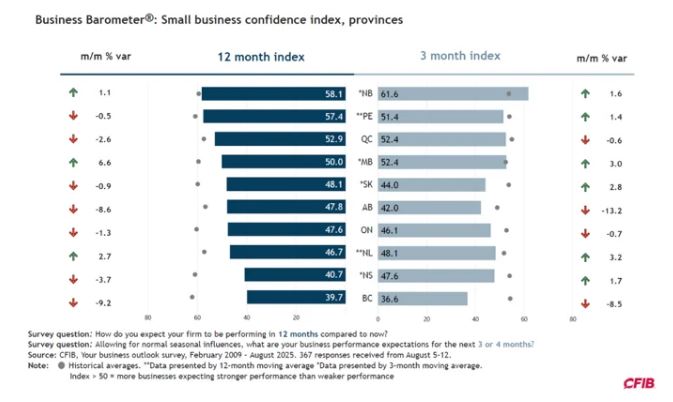The reasons are myriad.
Fewer customers spending less, high insurance, crushing taxes and regulations, wage costs, shortage of skilled labour and shortage of working capital.
All have combined to put BC at the bottom of the Canadian Federation of Independent Business' small business business confidence index with an abysmal score of 36.6 out of 100.
"Today's CFIB Business Barometer confirms what small business owners across British Columbia already know -- confidence has cratered and BC is falling behind the rest of the country," said Kelowna-Mission Conservative MLA Gavin Dew.
.jpg)
BC's 36.6% business confidence is a three month average included in the CFIB's August barometer, below all other provinces from No. 1 New Brunswick at 61.6% to No. 9 Nova Scotia at 47.6%.
See the full list here:

"While some provinces are managing to stay above the breakeven mark, British Columbia is not among them," said Dew, who is also official opposition critic for jobs, economic development and innovation.
"The reality is simple -- under the NDP, small businesses in this province have rock-bottom confidence and no reason to believe relief is on the way."
The confidence index is based on two essential questions:
1. How do you expect your firm to be performing in 12 months compared to now?
2. Allowing for normal seasonal influences, what are your business expectations for the next 3 or 4 months.
Barriers to growth figures in the barometer are national.
Those barriers are insufficient demand (aka not enough customers spending enough) at 49%, high insurance at 63%, high taxes and regulatory expenses also at 63%, wage costs 58%, shortage of skilled labour at 43% and shortage of working capital at 25%.
While employers may be feeling the pinch of paying wages, employees are feeling the pinch of not being paid enough.
While inflation is at 2.7%, wage increases are typically 2.1%, meaning workers are falling behind with every paycheque.
"Nearly half of businesses point to insufficient demand as a major barrier, while crushing costs -- from insurance to taxes to regulatory red tape -- continue to pile up," said Dew.
"Entrepreneurs are being squeezed from all sides and the NDP's only response is indifference and foot dragging."

Dew suggests the NDP cut government red tape to help restore business confidence.
"That is what a Conservative government will deliver," said Dew.
"Premier Eby and his government do not understand business and they are unresponsive to the struggles of the very people who keep our communities alive and our economy moving. Every day that they remain in power, jobs, livelihoods and hope are lost."
In the BC NDP 2025 budget, the government admitted these are challenging economic times.
Yet, it stressed the budget supported the economic growth needed to create the wealth needed for the services and programs British Columbians rely on.
The budget forecasted modest growth of 1.8% this year and 1.9% next, amid trade uncertainty with the US and housing construction remaining resilient.
Dew isn't convinced.
"We have seen 70,000 people leave BC for other provinces as opportunities dry up," said Dew.
"We are facing the worst youth unemployment since the end days of the 1990s Decade of Darkness, the last time the NDP ran our economy into the ground."








.jpg)










